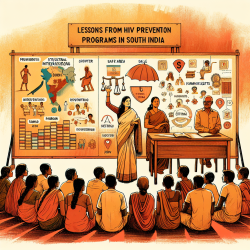Introduction
In the realm of HIV prevention, addressing the structural barriers that increase vulnerability is as crucial as the biomedical interventions themselves. A recent study, "Strategies for reducing police arrest in the context of an HIV prevention programme for female sex workers: evidence from structural interventions in Karnataka, South India," sheds light on innovative strategies that can be applied to enhance the effectiveness of HIV prevention programs, particularly for female sex workers (FSWs).
Understanding the Context
Female sex workers often face violence and harassment, which not only violates their rights but also increases their vulnerability to HIV. The study focuses on Karnataka, South India, where structural interventions were implemented to reduce police arrests of FSWs as part of the Bill and Melinda Gates Foundation's India AIDS Initiative (Avahan).
Key Findings
The research highlighted a significant decrease in the rates of police arrests of FSWs over time. From 9.9% in the second survey round to 6.1% in the third, the interventions demonstrated a clear impact. Arrests in the preceding year also dropped from 5.5% to 2.8%, showcasing the effectiveness of these interventions.
Strategies Implemented
The interventions included:
- Advocacy with Police: Engaging with senior police officials and conducting sensitization workshops to educate officers about human rights and the consequences of violating them.
- Empowerment of FSWs: Building capacity and collectivization among FSWs to better equip them to challenge police violence and harassment.
- Crisis Response Mechanisms: Establishing 24-hour crisis management systems to provide legal support and assistance to FSWs in distress.
Implications for Practitioners
Practitioners in the field of HIV prevention can draw valuable lessons from this study:
- Focus on Structural Interventions: Addressing the root causes of vulnerability, such as police harassment, can significantly improve the effectiveness of HIV prevention programs.
- Collaborate with Law Enforcement: Building partnerships with police can create a more enabling environment for FSWs and reduce instances of violence and arrest.
- Empowerment and Collectivization: Encouraging FSWs to form support groups can foster a sense of solidarity and collective action, reducing their vulnerability to violence.
Conclusion
The study underscores the importance of structural interventions in reducing police arrests and creating safer environments for FSWs. By tailoring interventions to address specific vulnerabilities, practitioners can enhance the overall impact of HIV prevention programs.
To read the original research paper, please follow this link: Strategies for reducing police arrest in the context of an HIV prevention programme for female sex workers: evidence from structural interventions in Karnataka, South India.










